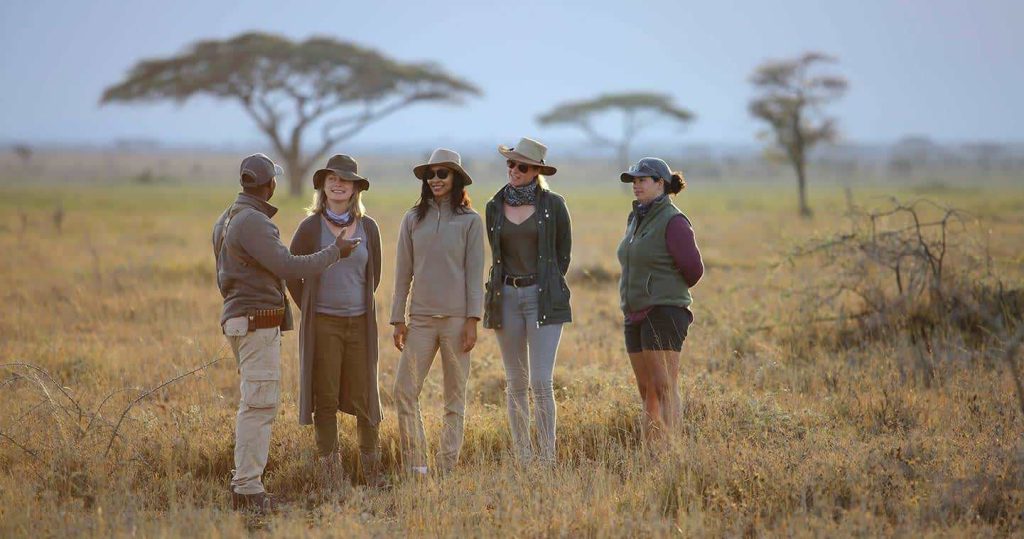Why a Family Safari is More Than Just a Vacation—It’s a Legacy
A safari is one of the few trips left in the world that can pull every member of the family away from their screens and into a shared state of wonder. It’s about the silent thrill of watching a herd of elephants cross the plains at sunset, the joy on your child’s face as they spot their first giraffe, and the campfire stories that will be told for years to come.
But for today’s parents, it’s about more than that. It’s a “teachable moment” on a grand scale. It’s a chance to show your children, firsthand, why conservation matters. It’s an opportunity to instill a sense of global citizenship and demonstrate that travel can be a powerful force for good. This guide will show you how to make that happen.
The Foundations of Ethical Safari Planning: A Simple Framework
The term “ethical” can feel vague. Our African experts simplify it by focusing on operators who are committed to what we call the “3 Cs.” This framework empowers you to look past the glossy brochures and understand the real impact of your choices.
Look for the 3 Cs: Conservation, Community, and Culture
- Conservation: Does the operator actively support the protection of wildlife and their habitats? This can range from using a portion of their fees to fund anti-poaching units to running their own conservation projects. They should practice responsible wildlife viewing—no crowding animals or driving off-road where it’s prohibited.
- Community: Does your trip benefit the local people? Ethical operators prioritize hiring and training local guides, managers, and staff. They source food from nearby communities and support local schools or health clinics. This ensures that the revenue from tourism directly improves the lives of the people who call that place home.
- Culture: Does the operator respect and preserve local culture? This means cultural interactions are authentic and dignifying, not staged performances. It involves educating guests on local customs and ensuring that tourism supports, rather than erodes, traditional ways of life.
Questions to Ask Any Safari Operator Before You Book
- Can you provide specific examples of your conservation and community projects?
- What percentage of your guides and lodge staff are from the local area?
- What is your policy on wildlife viewing distances and vehicle limits at a sighting?
- How do you minimize your environmental footprint (e.g., water, waste, energy)?

Where in Africa is Best for a Family Safari?
The “best” place depends entirely on your family’s ages, interests, and comfort level. Here’s a breakdown from our experts who have planned trips across the continent.
For First-Timers & Younger Kids: Malaria-Free South Africa
For parents with children under 10, the malaria-free reserves in South Africa’s Eastern Cape (like Madikwe, Welgevonden, and Phinda) are a game-changer. They remove the stress of anti-malarial medication while offering incredible Big Five viewing, excellent child-friendly lodges, and shorter, more engaging game drives.
For Classic “Big Five” Drama: Kenya and Tanzania
If your kids are a bit older and you’re dreaming of the classic, sweeping savanna landscapes from The Lion King, East Africa is unbeatable. Witnessing the Great Wildebeest Migration in Kenya’s Masai Mara or Tanzania’s Serengeti is a bucket-list experience that teaches a powerful lesson about ecosystems on a massive scale.
For Water-Based Adventures: Botswana and Zambia
For active families with teens, the water-based safaris in Botswana’s Okavango Delta or walking safaris in Zambia offer a different kind of adventure. Gliding through channels in a traditional mokoro (dugout canoe) or tracking wildlife on foot with an expert guide provides a more immersive and thrilling perspective.
Caption: From the malaria-free Eastern Cape to the vast plains of the Serengeti, there’s a perfect safari destination for every family.
The Big Question: Is a Safari Safe for My Children?
This is the number one concern for parents, and the answer is a resounding yes, provided you plan correctly and travel with a reputable operator. Safety is the top priority for every vetted operator, with established protocols for every possibility.
Health & Vaccinations: A Practical Checklist
- Consult a Doctor: Always consult your pediatrician or a travel clinic 4-6 weeks before your trip to discuss required vaccinations and health precautions.
- Malaria: If traveling to a malaria area, your doctor will advise on the best prophylactic medication for your child’s age and weight. Using insect repellent with DEET, covering up at dawn and dusk, and sleeping under mosquito nets are also crucial.
- First-Aid Kit: While lodges are well-equipped, it’s wise to bring a personal kit with child-specific medications, antihistamines, antiseptic wipes, bandages, and any prescription drugs.
Wildlife Safety: The Golden Rules of the Game Drive
Your guide is your ultimate protector. They are highly trained in animal behavior and safety protocols. The key is to listen to them—always.
- Stay in the Vehicle: Never get out of the safari vehicle unless you are in a designated safe area and your guide says it’s okay.
- No Loud Noises: Teach children to use their “inside voice” to avoid startling wildlife.
- Keep Arms Inside: Always keep your entire body, including hands and camera lenses, inside the vehicle.
- Do Not Feed Animals: This is a critical rule that protects both you and the wildlife.
Choosing Child-Friendly Lodges and Guides
Not all lodges are created equal when it comes to kids. The best family-friendly lodges offer:
- Family Suites: Interconnecting rooms or spacious family tents.
- Flexible Schedules: Willingness to offer shorter game drives or flexible meal times.
- Engaging Guides: Guides who are specially trained and passionate about teaching children about the bush.
- Junior Ranger Programs: Fun, educational activities like animal track identification, bow-and-arrow making, or bush survival skills.
Ready to find the perfect fit? Our AI Safari Quiz takes 3 minutes and can match your family’s specific needs with operators who have vetted, child-friendly credentials.
Decoding the Cost of Your Family Safari
A safari is a significant investment, and understanding the costs can be confusing. The price can vary dramatically, but it’s driven by factors like exclusivity, comfort level, and season.
What’s Included? From Park Fees to Private Guides
A quality safari is typically all-inclusive. This usually covers:
- Accommodation: Your lodge or tented camp.
- All Meals & Drinks: Most local drinks are included.
- Game Drives: Usually two per day in a specialized 4×4 vehicle.
- Expert Guide: A professional, certified guide.
- Park & Conservancy Fees: These fees are a crucial source of funding for conservation.
- Internal Transfers: This can include charter flights between remote camps.
Why the Cheapest Safari is Never the Best Value
Bargain-basement prices often come with hidden costs—to you, the environment, and the local community. They can mean poorly maintained vehicles, underpaid (or unqualified) guides, crowded game drives, and a complete disregard for conservation. An ethical safari invests in well-paid staff, contributes significantly to park fees, and maintains high safety standards. This is where your investment delivers true value—a seamless, safe, and impactful experience.
Get a personalized budget estimate based on your travel style and interests with our free Safari Cost Calculator.
Packing Smart: The Essential Family Safari Checklist
Packing correctly makes a huge difference. The key is light layers, soft-sided luggage (for small charter planes), and neutral colors.
Clothing: Layers, Neutral Colors, and Comfort
- Colors: Khaki, green, and brown are best. Avoid bright colors, white (it gets dirty fast), and dark blue/black (which can attract tsetse flies in some areas).
- Layers: Pack lightweight long-sleeved shirts, T-shirts, a warm fleece or jacket for chilly mornings, and comfortable trousers or shorts.
- Essentials: A wide-brimmed hat, sunglasses, comfortable walking shoes, and a swimsuit for the lodge pool.
Health Kit Essentials for Parents
Beyond the basics, include motion sickness medication for bumpy roads or small flights, rehydration salts, and any personal prescription medications with a copy of the prescription.
For the Kids: Binoculars, Journals, and Entertainment
- Binoculars: A dedicated pair for each child is a must-have to keep them engaged.
- Journal & Pencils: Encourage them to draw the animals they see and write down their favorite moments.
- Field Guide: A simple, illustrated animal checklist or field guide.
- Offline Entertainment: Download movies or games onto a tablet for travel days or downtime at the lodge.
Caption: Packing smart means focusing on layers, neutral colors, and essential gear to keep kids engaged and comfortable.
Making it a True Teachable Moment: Preparing Your Kids for Africa
The learning doesn’t start when you land. Building anticipation and context beforehand will transform your children’s experience from passive observation to active engagement.
Books to Read and Documentaries to Watch
- For Younger Kids: Read classics like Giraffes Can’t Dance or National Geographic Kids books about African animals.
- For Older Kids: Watch incredible documentary series like Our Planet or Planet Earth, focusing on the Africa episodes. Discuss the conservation challenges they highlight.
Learning a Few Words in Swahili or Local Languages
Learning simple greetings can make a huge difference in connecting with local people. “Jambo” (Hello) and “Asante sana” (Thank you very much) in Swahili are a great start.
Setting Expectations: From Early Mornings to Digital Detox
Prepare kids for the rhythm of safari life: early wake-up calls for the best animal viewing, long periods of quiet observation, and limited Wi-Fi. Frame the digital detox as part of the adventure—a chance to truly connect with nature and each other.
Frequently Asked Questions About Family Safaris
1. What is the best age to take a child on safari?
While many lodges welcome younger children, our African experts find the magic really clicks for kids aged 8 and up. At this age, they have the patience for game drives, are old enough to understand and follow safety instructions, and are able to create lasting memories of the experience.
2. Are safaris boring for kids?
Not if you choose the right operator! A great family safari is action-packed. Between game drives, lodges with pools, and Junior Ranger programs where kids learn to track animals or make traditional crafts, there is plenty to keep them excited and engaged.
3. How long should a family safari be?
For a first family safari, 7 to 10 days is ideal. This allows you to explore two or three different areas without feeling rushed and builds in enough downtime to relax by the pool. It prevents travel fatigue, which is especially important for younger travelers.
4. Can we accommodate dietary restrictions for children?
Absolutely. Reputable lodges are very accustomed to catering to dietary needs, from allergies to picky eaters. Just be sure to provide all the details well in advance during the planning phase so the remote camps can prepare accordingly.
5. What happens if there’s a medical emergency?
All vetted safari operators have detailed emergency plans. Guides are trained in first aid, and lodges have 24/7 communication with medical support staff. For serious incidents, there are services like the Flying Doctors in East Africa that provide emergency medical evacuation to top-tier hospitals.
Your Journey Starts Here
Planning a safe and ethical family safari doesn’t have to be overwhelming. By focusing on experienced operators who prioritize conservation and community, you can create a journey that is not only breathtakingly beautiful but also deeply meaningful. It’s a chance to give your children a new perspective on the world and their place in it.
The most important takeaway is this: your choice matters. Every responsible safari you book is a vote for protecting Africa’s magnificent wildlife and empowering its people for generations to come.
Ready to turn your dream trip into a reality? Sign up for our newsletter for expert tips, destination guides, and inspiration delivered straight to your inbox.
